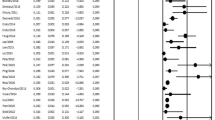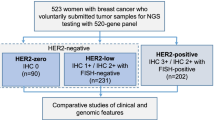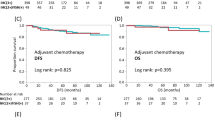Abstract
Background
Human epidermal growth factor receptor 2 (HER2) gene amplification/overexpression is a major therapeutic target in breast cancer, and has been introduced as a predictive biomarker to identify patients who may benefit from therapy with anti-HER2 agents. HER2 somatic mutations have been reported, and these may influence the effect of HER2-targeted drugs.
Methods
Here, we sought HER2 mutations in a group of 135 Japanese breast cancer patients with HER2-positive tumors. We analyzed HER2 mutations by direct Sanger sequencing of two major areas, the extracellular domain at position 309–310 and the kinase domain between 755 and 781.
Results
Two patients with the HER2 somatic mutation S310F in the extracellular domain were found in this series. One patient with the S310F mutation had a node-negative invasive ductal carcinoma classified as HER2 2+ by the HercepTest and fluorescence in situ hybridization (FISH) positive, and which was estrogen receptor (ER)-negative and progesterone receptor (PgR)-negative. Another patient with the S310F mutation had an apocrine carcinoma with seven lymph nodes positive for metastasis, classified as HER2 3+ by the HercepTest, but which was FISH-negative, as well as ER-negative and PgR-negative. Both patients had received adjuvant single-agent trastuzumab therapy, and had no local recurrence or distant metastasis for five and three years after surgery, respectively.
Conclusions
Our data show that HER2 mutations are rare in HER2-positive Japanese breast cancer patients. The two mutations found in this study were identical, S310F. We suggest that in vitro experiments to determine whether the S310F mutation could be involved in resistance to anti-HER2 drugs are worthwhile in future.


Similar content being viewed by others
References
Desmedt C, Haibe-Kains B, Wirapati P, Buyse M, Larsimont D, Bontempi G, et al. Biological processes associated with breast cancer clinical outcome depend on the molecular subtypes. Clin Cancer Res. 2008;14:5158–65.
Baselga J, Cortes J, Kim SB, Im SA, Hegg R, Im YH, et al. Pertuzumab plus trastuzumab plus docetaxel for metastatic breast cancer. N Engl J Med. 2012;366:109–19.
Piccart-Gebhart MJ, Procter M, Leyland-Jones B, Goldhirsch A, Untch M, Smith I, et al. Trastuzumab after adjuvant chemotherapy in HER2-positive breast cancer. N Engl J Med. 2005;353:1659–72.
Slamon DJ, Clark GM, Wong SG, Levin WJ, Ullrich A, McGuire WL. Human breast cancer: correlation of relapse and survival with amplification of the HER-2/neu oncogene. Science. 1987;235:177–82.
Slamon DJ, Godolphin W, Jones LA, Holt JA, Wong SG, Keith DE, et al. Studies of the HER-2/neu proto-oncogene in human breast and ovarian cancer. Science. 1989;244:707–12.
Bose R, Kavuri SM, Searleman AC, Shen W, Shen D, Koboldt DC, et al. Activating HER2 mutations in HER2 gene amplification negative breast cancer. Cancer Discov. 2013;3:224–37.
Endo Y, Dong Y, Yoshimoto N, Asano T, Hato Y, Yamashita H, et al. HER2 mutation status in Japanese HER2-negative breast cancer patients. Jpn J Clin Oncol. 2014;44:619–23.
Elston CW, Ellis IO. Pathological prognostic factors in breast cancer. I. The value of histological grade in breast cancer: experience from a large study with long-term follow-up. Histopathology. 1991;19:403–10.
Allred DC, Harvey JM, Berardo M, Clark GM. Prognostic and predictive factors in breast cancer by immunohistochemical analysis. Mod Pathol. 1998;11:155–68.
Weigelt B, Reis-Filho JS. Activating mutations in HER2: neu opportunities and neu challenges. Cancer Discov. 2013;3:145–7.
Kan Z, Jaiswal BS, Stinson J, Janakiraman V, Bhatt D, Stern HM, et al. Diverse somatic mutation patterns and pathway alterations in human cancers. Nature. 2010;466:869–73.
Banerji S, Cibulskis K, Rangel-Escareno C, Brown KK, Carter SL, Frederick AM, et al. Sequence analysis of mutations and translocations across breast cancer subtypes. Nature. 2012;486:405–9.
Research Cancer Genome Atlas. N. Integrated genomic analyses of ovarian carcinoma. Nature. 2011;474:609–15.
Loi S, Michiels S, Lambrechts D, Fumagalli D, Claes B, Kellokumpu-Lehtinen PL, et al. Somatic mutation profiling and associations with prognosis and trastuzumab benefit in early breast cancer. J Natl Cancer Inst. 2013;105:960–7.
Shah SP, Morin RD, Khattra J, Prentice L, Pugh T, Burleigh A, et al. Mutational evolution in a lobular breast tumour profiled at single nucleotide resolution. Nature. 2009;461:809–13.
Shah SP, Roth A, Goya R, Oloumi A, Ha G, Zhao Y, et al. The clonal and mutational evolution spectrum of primary triple-negative breast cancers. Nature. 2012;486:395–9.
Barretina J, Caponigro G, Stransky N, Venkatesan K, Margolin AA, Kim S, et al. The cancer cell line encyclopedia enables predictive modelling of anticancer drug sensitivity. Nature. 2012;483:603–7.
Greulich H, Kaplan B, Mertins P, Chen TH, Tanaka KE, Yun CH, et al. Functional analysis of receptor tyrosine kinase mutations in lung cancer identifies oncogenic extracellular domain mutations of ERBB2. Proc Natl Acad Sci USA. 2012;109:14476–81.
Vornicova O, Hershkovitz D, Yablonski-Peretz T, Ben-Itzhak O, Keidar Z, Bar-Sela G. Treatment of metastatic extramammary Paget’s disease associated with adnexal adenocarcinoma, with anti-HER2 drugs based on genomic alteration ERBB2 S310F. Oncologist. 2014;19:1006–7.
Acknowledgments
This work was, in part, supported by JSPS KAKENHI Grant No. 24591916.
Author information
Authors and Affiliations
Corresponding author
Ethics declarations
Conflict of interest
TT. received a research grant from Takeda Pharmaceutical Co., Ltd., Daiichi Sankyo Healthcare Co., Ltd. and Novartis Pharma K.K. The other authors declare no relevant conflicts of interest.
About this article
Cite this article
Endo, Y., Dong, Y., Kondo, N. et al. HER2 mutation status in Japanese HER2-positive breast cancer patients. Breast Cancer 23, 902–907 (2016). https://doi.org/10.1007/s12282-015-0659-y
Received:
Accepted:
Published:
Issue Date:
DOI: https://doi.org/10.1007/s12282-015-0659-y




